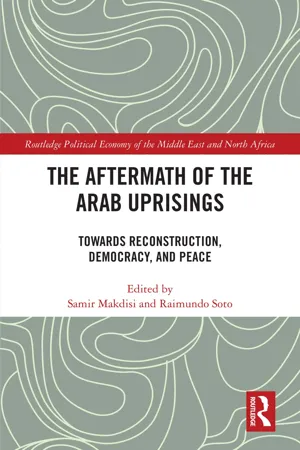
The Aftermath of the Arab Uprisings
Towards Reconstruction, Democracy and Peace
- 258 pages
- English
- ePUB (mobile friendly)
- Available on iOS & Android
The Aftermath of the Arab Uprisings
Towards Reconstruction, Democracy and Peace
About this book
Unlike other books on the Arab uprisings of 2010–2011 which focus on why they occurred, this book looks instead towards the future of three countries—Syria, Libya, and Yemen—where the violence and instability initiated by the uprisings persist. It additionally examines the case of Iraq which continues to suffer from a precarious political situation introduced by the US-led invasion of 2003. The book investigates what should be done to achieve inclusive political and economic development and eventually a lasting peace. It describes the particular circumstances in each of the four countries, and analyses the common challenges facing them such as the need to achieve economic diversification, control inflation, raise employment levels, husband fiscal expenditures, control corruption, and implement transparent policies. It argues that in the four countries any lasting settlement must involve an explicitly stated new social contract that lays the foundation for inclusive socio-economic development and a genuinely democratic environment. In addition, a massive transformation is required of the institutional fabric of society, that is, the set of key institutions that helped create the conditions for conflict. Moreover, the book argues that any successful transition hinges on anticipating the potential for political and economic development that an eventual peace agreement will open. This can only be done by envisioning and planning the reforms that ought to be implemented, and building up political support for the transition phase.
Frequently asked questions
- Essential is ideal for learners and professionals who enjoy exploring a wide range of subjects. Access the Essential Library with 800,000+ trusted titles and best-sellers across business, personal growth, and the humanities. Includes unlimited reading time and Standard Read Aloud voice.
- Complete: Perfect for advanced learners and researchers needing full, unrestricted access. Unlock 1.4M+ books across hundreds of subjects, including academic and specialized titles. The Complete Plan also includes advanced features like Premium Read Aloud and Research Assistant.
Please note we cannot support devices running on iOS 13 and Android 7 or earlier. Learn more about using the app.
Information
Table of contents
- Cover
- Half Title
- Series Page
- Title Page
- Copyright Page
- Dedication
- Table of Contents
- List of Figures
- List of Tables
- Acknowledgements
- List of Contributors
- Preface
- Part I Post-Conflict Development And Democratic Governance
- Part II Country Studies
- Concluding Remarks
- Bibliography
- Index